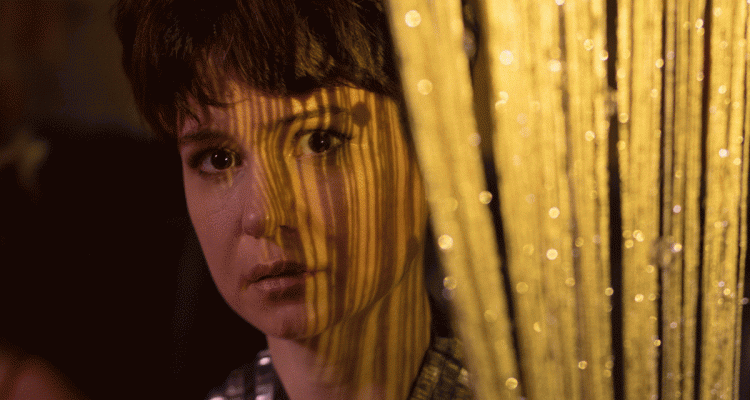In the throes of grief, a thick haze can descend on one’s life, making what was familiar seem strange and what was certain seem questionable. Yet as the film “State Like Sleep” shows, this painful state of detachment from ordinary life can push someone to travel outside their normal routine and seek answers in places and people that might never have been encountered otherwise.
The debut feature from director Meredith Danluck, making her feature film debut, “State Like Sleep” channels some autobiographical elements from Danluck’s life into the story of Katherine Grand (Katherine Waterston), an American photographer whose celebrity husband Stefan (Michiel Huisman) dies suddenly in his native Brussels. Although the couple was in the midst of a separation, due mostly to an escalating drug habit, Katherine is devastated by the death and initially flees to America to avoid dealing with any of it. But a year later, she discovers that, in her absence, her mother (Mary Kay Place) has traveled to Brussels at the behest of Stefan’s mother Anneke (Julie Kahner) to pack up Katherine’s former apartment before it’s sold, only to have a stroke and be hospitalized. Katherine rushes back to Brussels to aid her mother and also must finally confront the mysteries surrounding Stefan’s death. Was it a suicide as ruled? Who was the mysterious woman he was photographed with? What secrets hide at the mysterious nightclub, Le Bellefleur?
Katherine’s grief blends well with the tone of a noir-ish mystery, blanketing the foreign city in a layer of menace and intrigue. Danluck creates a fascinating tone, aided by excellent camerawork from cinematographer Christopher Blauvelt, which gives space to Katherine’s grief while hinting at unseen mysteries just out of frame. Yet the grief is far more central than the mysteries, which titillate until mostly dissolving into red herrings. The aforementioned Le Bellefleur hosts some of the most beguiling scenes, as for a while it seems Katherine might be drawn into an “Eyes Wide Shut”-style demimonde. However, it turns out the nightclub is only pertinent for its owner Emile (Luke Evans), a childhood friend Stefan had hidden from Katherine.
Mary Kay Place is excellent as Katherine’s concerned, exasperated, and very American mother (the culture clash confrontations between her and the disapproving Anneke are a joy to watch), but she often feels disconnected from the rest of the story. Even more disconnected from the main plot is Katherine’s encounter with Edward (Michael Shannon), an American hotel neighbor that she first meets as a drunken lout, but who reveals himself to be a sympathetic (if married) listener, as the two become lovers. It’s a pleasure to see Shannon allowed to be somewhat charming, giving emotional heft to a “two ships passing in the night” moment, and it must be said that his romance with Waterston is far more rewarding than the flashbacks showing Katherine and Stefan, which add nothing to the story other than making the overprotective Anneke seem suspicious.
Overall, “State Like Sleep” is a satisfying movie about grief and an unsatisfying mystery. Waterston gives her best performance to date, showing every step of her character’s long emotional climb out of grief and back into the world of the living. “State Like Sleep” illustrates how genre elements can enhance interest in personal drama, but also how those elements can breed dissatisfaction if not actually developed. But in the midst of the subpar mystery is a well-made drama that shows the need to develop a personal narrative to be able to move on from loss. [B-]
Follow along with all our 2018 Tribeca Film Festival coverage here.

